副词详细讲解ppt课件
合集下载
副词-专升本英语语法详细讲解课件

意。
Have you been there already?
③做“还”讲时, yet用于否定句, still用于肯定 句、疑问句, 表示“依然、继续”, 有时也用于 否定句。
The rain hasn’t stopped yet.
It’s still raining now.
四.同源副词
A)
5.I used to smoke _______ but I gave it up three years ago.
A) seriously B) heavily C) badly D) severely
B)
6.The organization had broken no rules, but _____ had it acted responsibly. A) neither B) so
A) essentially B) completely C) necessarily D) remarkably
A)
3.Our journey was slow because the train stopped ________ at different villages.
A) unceasingly B) gradually C) continuously D) continually
4.so, neither与nor
三个词都能表示后者和前者情况相似。 so用于肯定句, neither和nor用于否定 句。
①He likes skating. So do I. ②The first one wasn't good, and
neither/nor was the second.
2. late, lately late意思是“晚”, lately意思为“近来” You have come too late. Have you see him lately?
Have you been there already?
③做“还”讲时, yet用于否定句, still用于肯定 句、疑问句, 表示“依然、继续”, 有时也用于 否定句。
The rain hasn’t stopped yet.
It’s still raining now.
四.同源副词
A)
5.I used to smoke _______ but I gave it up three years ago.
A) seriously B) heavily C) badly D) severely
B)
6.The organization had broken no rules, but _____ had it acted responsibly. A) neither B) so
A) essentially B) completely C) necessarily D) remarkably
A)
3.Our journey was slow because the train stopped ________ at different villages.
A) unceasingly B) gradually C) continuously D) continually
4.so, neither与nor
三个词都能表示后者和前者情况相似。 so用于肯定句, neither和nor用于否定 句。
①He likes skating. So do I. ②The first one wasn't good, and
neither/nor was the second.
2. late, lately late意思是“晚”, lately意思为“近来” You have come too late. Have you see him lately?
副词ppt课件

11
3.表推测估量的有:或、得无、可等。 相当于“或许”“该不会”“大约”。
予尝求古仁人之心,或异二者之为。 (《岳阳楼记》) 览物之情,得无异乎?(《岳阳楼记》) 舟首尾长约八分有奇,高可二黍许。 4.表反问:宁、其。 (《核舟记》)
12
巩固练习:
1.指出下列句子中的时间副词并解释其 ——尝:曾经 意义: ——既:已经 予尝求古仁人之心 ——即:立即 ——忽:忽然 既克,公问其故 ——新:刚刚 乍:突然 处即刺杀虎 忽有一庞然大物拔山倒树而来 晶晶然如镜之新开而冷光乍出于匣
7
未果,寻病终。(《桃花源记》) 未几,夫鼾声起。(《口技》)
5.表示时间紧迫、急剧的有:急、遽(jù)。相当于“立 刻”、“马上”、“急忙”等。 行欲至宛市,定伯便担鬼著肩上,急执之。(《宋定 伯捉鬼》) 遽契其舟。(《吕氏春秋 察今》)
4.表示时间短暂:寻、未几。可译作 “不久”等。
8
男女衣着,悉如外人。(《桃花源记》) 公等遇雨,皆已失期。(《陈涉世家》) 村中闻有此人,咸来问讯。(《桃花源 记》) 一时齐发,众妙毕备。(《口技》) 宫中府中,俱为一体。(《出师表》)
4
惟不喜人唾(《宋定伯捉鬼》) 不闻爷娘唤女声,但闻燕山胡骑鸣啾啾。 (《木兰诗》) 担中肉尽,止有剩骨。(《狼》) 3.表共同:共、并、俱、偕。可译为“共同,一 初极狭,才通人。(《桃花源记》) 起”。 独善其身。独一无二。(成语) 苏黄共阅一卷。(《核舟记》)
9
(五)情态副词
1.表示“突然”“忽然”的意思有:暴、忽 屠暴起,以刀劈狼首。(《狼》) 等。 忽逢桃花林。(《桃花源记》)
2.表示渐进、逐步发展的有:稍、渐等,表示“渐渐”“逐渐”。 蔽林间窥之,稍出近之。(《黔驴技穷》) 未几,夫鼾声起,妇拍儿亦渐拍渐止。(《口技》)
形容词和副词(共19张PPT)

04
形容词和副词的特殊用法
形容词的特殊用法
形容词作名词
形容词的比较级和最高级
某些形容词可以作为名词使用,如“ 幸福”、“成功”等,表示一种状态 或结果。
形容词有比较级和最高级的用法,用 于描述程度或数量的差异,如“更快 ”、“最高”等。
形容词修饰名词
形容词可以放在名词前面,用来描述 名词的特征或属性,如“美丽的花朵 ”、“高大的建筑”等。
详细描述
副词用于描述动词、形容词或其他副词的行为方式、程度、时间、频率等,对于准确表达动作或状态的细节至关 重要。通过副词选择题,可以练习副词在不同语境中的用法,如描述动作发生的时间、方式、频率等,判断副词 的正确用法和意义。
综合练习
总结词
提高综合运用形容词和副词的能力
详细描述
综合练习是将形容词和副词结合在一起使用的练习方式,通过设置语境和情境,让学生根据上下文选 择合适的形容词和副词,以增强学生对形容词和副词的理解和应用能力。综合练习可以包括填空、改 错、翻译等形式,让学生在实际运用中提高对形容词和副词的掌握程度。
副词的比较级和最高级
副词的比较级
用于描述动作、状态或方式在两个或更多的人或事物之间的 相对差异。通常在副词后加“-er”或“more + 副词原形” 构成比较级。例如,“faster”和“more beautifully”。
副词的最高级
用于描述动作、状态或方式在三个或更多的人或事物中的最 高或最低程度。通常在副词后加“-est”或“most + 副词原 形”构成最高级。例如,“fastest”和“most beautifully”。
THANK YOU
ห้องสมุดไป่ตู้感谢各位观看
表示动作的程度,如“very”、 “too”、“quite”、“almost”等 。
形容词副词变化规则公开课PPT课件

的作用。
02
学习形容词和副词的变化规则
通过系统的学习,学生能够掌握形容词和副词在时态、语态、语气等方
面的变化规则,提高语言运用的准确性和规范性。
03
培养学生的语言感知和运用能力
通过学习形容词和副词的变化规则,学生能够更加敏锐地感知语言的美
感和韵律,提高语言表达的生动性和形象性。
形容词和副词定义及作用
ly。
有些以-ble或-ple结尾的形容 词,去掉e加-y。
一部分以元音字母+e结尾的 形容词变副词时要去掉e。
不规则副词变化
well/better/best(好), badly/worse/worst(坏)等是不规则变化的副 词,需要单独记忆。
far/further/furthest(远)等词在表示距离时, 其比较级和最高级可以用farther和farthest, 但在表示程度时只能用further和furthest。
02
以e结尾的副词直接加-r构成比 较级,加-st构成最高级。
03
重读闭音节副词,双写最后一 个辅音字母,再加-er或-est。
04
以辅音字母+y结尾的副词,改 y为i再加-er或-est。
副词词尾变化
01
02
03
04
一般在形容词的词尾加-ly可 以变成相应的副词。
一些以“辅音字母+y”结尾 的形容词,要把y改为i再加-
多音节词和部分双音节词 ,在词前加“more”或
“most”。
形容词词尾变化
以“le”结尾的形容词,去 “e”加“-y”构成副词。
部分形容词词尾变化特殊,需单 独记忆。
01
02
一般情况下,形容词词尾直接加 “-ly”构成副词。
英语副词ppt课件精选全文完整版
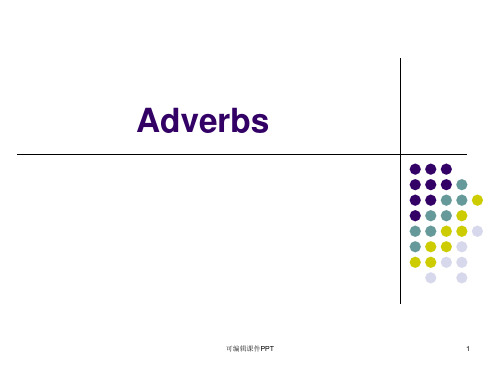
可编辑课件PPT
21
副词的比较等级构成
单音节和个别双音节副词通过加后-er ,-est 构成比较级和最高级。 high higher highest fast faster fastest
绝大多数副词借助more ,most 构成比较级和最高级 clearly more clearly most clearly easily more easily most easily slowly more slowly most slowly
可编辑课件PPT
19
副词的排列次序 ——练习题1
A: ________________ . B: So did I.
B
A. I saw her last Sunday at the party B. I saw her at the party last Sunday C. At the party I saw her last Sunday D. At the party last Sunday I saw her
Adverbs
可编辑课件PPT
1
Outline
1. 副词的构成 2. 副词的分类 3. 副词的功能 4. 副词的位置 5. 副词的排列顺序 6. 副词的比较等级 7. 易混淆副词 8. 练习题 9. Homework
可编辑课件PPT
2
副词的构成
一、大部分副词由相应的形容词加后缀 -ly构成,但注意有变化: happy—happily subtle—subtly true—truly loose—loosely democratic—democratically public—publicly dull—dully
副词的排列次序
1. 地点副词→时间副词 方式副词→时间副词 方式副词→地点副词→时间副词 (有时,时间副词亦可放在句首)
汉语副词教学PPT-PPT课件
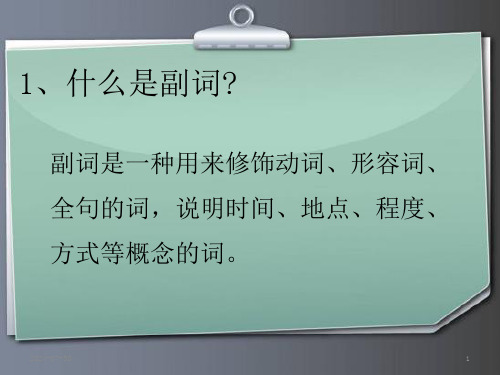
12
2024-07-30
8
例子 : 我不吃早饭了。- 主观、现在 我没吃早饭呢。- 客观、现在
你昨天怎么不去看电影? - 过去 你昨天怎么没去看电影? - 过去
我明天不去看电影了。- 主观、将来
2024-07-30
9
② 否定经常性、习惯性的动作、 状况或非动作性动词,要用"不"。
例子 : 他从来不迟到。 / 他不抽烟、不喝酒。
1、什么是副词?
副词是一种用来修饰动词、形容词、 全句的词,说明时间、地点、程度、 方式等概念的词。
2024-07-30
1
2、副词语法功能
1) 不能做谓语,也不能做主宾语,只能做状语 2) 副词是附着性的,大多数不能单用。
2024-07-30
2
3) 有一部分副词具有关联性作用。 有的可以独用,有的可以合用,有的还可以 和连词配合使用。
: 立刻、马上、一再、渐渐、已经、常常、刚
4) 表示情态的副词
: 一起、互相、亲自、尽情
2024-07-30
5
5) 表示否定的副词
: 不、没、非、别、一定、必然、确实、大概
6) 表示语气的副词
: 并、才、就、反正、果然、居然、难道、究竟
2024-07-30
6
4、部分副词用法的区别
"不"与"没有(没)"
- "没"和"没有"意思和用法完全一样 - "没"一般只用在口语里 - "不"、没有"都可以用在动词、形容词前,
对动作、性状进行否定。
2024-07-30
7
① "不"多用于主观叙述,可以否定现在、 过去和将来的动作行为
中考英语复习课件:副词 (共28张PPT)
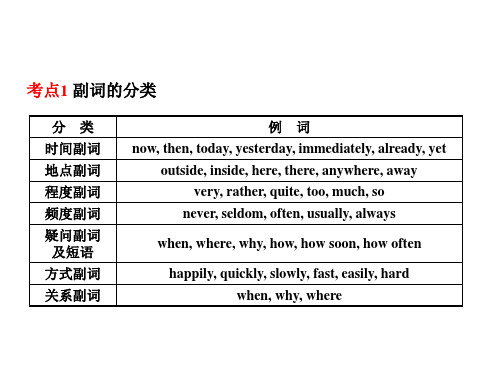
考点1 副词的分类
分 类 例 词
时间副词
now, then, today, yesterday, immediately, already, yet
地点副词
程度副词 频度副词 疑问副词 及短语 方式副词 关系副词
outside, inside, here, there, anywhere, away
careful with it!
A. very B. quite C. so D. too
D
6. (· 龙东中考)My cousin is __ heavy C because he often
eats ___fast food.
A. much too; too many C. much too; too much 7. (· 襄阳中考)—Can you catch what the speaker is saying, Tina? B. too much; too much
—It starts ___ at eight o'clock every evening. A A. exactly B. recently C. widely
5. (· 荆州中考)—The boys are talking about the football match ___. —Yes. They B have so many fun things to share.
A. How often
C. How long
B. How soon
14. (· 福建中考)—___ has B Hong Kong been back to our motherland? —For 20 years. How time flies!
分 类 例 词
时间副词
now, then, today, yesterday, immediately, already, yet
地点副词
程度副词 频度副词 疑问副词 及短语 方式副词 关系副词
outside, inside, here, there, anywhere, away
careful with it!
A. very B. quite C. so D. too
D
6. (· 龙东中考)My cousin is __ heavy C because he often
eats ___fast food.
A. much too; too many C. much too; too much 7. (· 襄阳中考)—Can you catch what the speaker is saying, Tina? B. too much; too much
—It starts ___ at eight o'clock every evening. A A. exactly B. recently C. widely
5. (· 荆州中考)—The boys are talking about the football match ___. —Yes. They B have so many fun things to share.
A. How often
C. How long
B. How soon
14. (· 福建中考)—___ has B Hong Kong been back to our motherland? —For 20 years. How time flies!
副词完整ppt课件

• (3)表示三者或三者以上的比较,用最高级。
• He runs(the)fastest in his class.在他班上他跑得最快。
• She jumps(the)farthest of the girls.在那些女孩中,她跳得最
远。
• 5.副词的比较级和最高级的构成
•
与形容词比较级构成的规则相同。
• 2.There are a _fe_w______ (few, little ) eggs in the box.
• 3.He speaks English __fa_s_t____ (slow, fast). • 4.I can't read this word,t_o_o______ (either, too). • 5.He plays tennis __w_e_ll____ (good, well).
• as 变than
.
整理版课件
11
4 Nowadays, all the children live happy.
• happy 变happily
.
5 Linda’s box is heaviest of the three. Let’s
help her.
• heaviest 前加the
.
整理版课件
12
照例句改写句子
• A:The book is new.
This is a new book
• 1.That woman is thin.
• 2.That clock is new.
• 3.Those bikes are cold.
• 4.This apple is big.
• 5.These babies are lovely.
副词的基本用法及它的比较级和最高级PPT课件

.
5
副词的比较级和最高级
副词的比较级和最高级的构成规则和形容词比较级和最高
级构成规则大致相同,分为规则变化和不规则变化。
规则的变化就是:
变比较级在词尾加er或在前面加more.
变最高级在词尾加est或在前面加most.
不规则的如下表
原级
比较级
最高级
good,well
better
best
.
4
Remember!
在英语中有形容词和副词是相同的: fast , early , late , last , far , hard , pretty , bright and so on.
有些以ly结尾的单词并不是副词,而是形容词: friendly友好的 lonely孤单的 lovely可爱的
I’m really tired after last night’s tennis match.
Staying at home is very safe.
(adv+adj)
Tony learns Chinese really carefully.
The teacher speaks very slowly and carefully. (adv+adv)
位于名词之前
作定语
位于连系动词之后 作表语
例句 Mr Wang speaks very slowly.
The meeting was over. She’s a hard-working student. Everyone looks sad.
.
3
副词与形容词的转化
许多副词都是在形容词词尾直接加ly构成的; careful → carefully quick → quickly safe →safely 以le结尾的形容词须去掉e再加y; possible →possibly gentle → gently(温柔的) 以y结尾的形容词须把y改为i再加ly; busy → busily heavy → heavily happy →happily easy →easily
副词的用法ppt课件

表结果:therefore因此, accordingly从而
表对比:however不管怎样,nevertheless然而 表条件:otherwise否则 表时间:then然后, lastly最后 表示添补:besides此外, moreover再者
7
副词在句中的作用
1、做状语修饰动、形、副或整个句子 1)He had worked hard all his life.(修饰动词work)
程度副词 a bit有点 very很 quite 十分 much很 only仅仅
句子副词 actually实际上 by all means绝不 obviously显然地
连接副词 Therefore 因此 besides此外 however不管怎样 功
疑问副词 When 是么时候 where哪里 why为什么
副词的用法
副词可以用来修饰动词、形容词、 其它副词以及全句
1
分类标准 类 型ቤተ መጻሕፍቲ ባይዱ
例句
方式副词 Carefully小心地 patiently耐心地 proudly自豪地
意 地点副词 Here这里 there那里 above在上方 down在下方
时间副词 Recently最近 nowadays现在 still仍然 already已经 义
比较原级如:very good,much better 2.Much可以修饰v.而very则不常用于修饰v
I enjoyed the concert (very)much.
I very like playing the violin.(ˣ)
6
5、连接副词
程度副词用于连接句子、短语、分句或从句表 达各种关系:
3
2、地点副词
表对比:however不管怎样,nevertheless然而 表条件:otherwise否则 表时间:then然后, lastly最后 表示添补:besides此外, moreover再者
7
副词在句中的作用
1、做状语修饰动、形、副或整个句子 1)He had worked hard all his life.(修饰动词work)
程度副词 a bit有点 very很 quite 十分 much很 only仅仅
句子副词 actually实际上 by all means绝不 obviously显然地
连接副词 Therefore 因此 besides此外 however不管怎样 功
疑问副词 When 是么时候 where哪里 why为什么
副词的用法
副词可以用来修饰动词、形容词、 其它副词以及全句
1
分类标准 类 型ቤተ መጻሕፍቲ ባይዱ
例句
方式副词 Carefully小心地 patiently耐心地 proudly自豪地
意 地点副词 Here这里 there那里 above在上方 down在下方
时间副词 Recently最近 nowadays现在 still仍然 already已经 义
比较原级如:very good,much better 2.Much可以修饰v.而very则不常用于修饰v
I enjoyed the concert (very)much.
I very like playing the violin.(ˣ)
6
5、连接副词
程度副词用于连接句子、短语、分句或从句表 达各种关系:
3
2、地点副词
初中语文 七年级下学期语法知识 《 副词 》 课件(22张PPT)
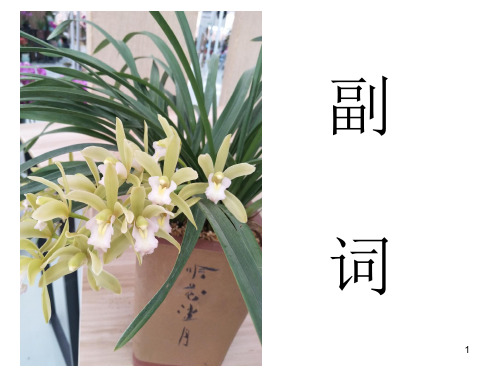
★辨别词性应该从该词语的语法 功用入手。如果无法一下子判定 词性,可尝试运用排除法。
4
1)李先生有一份记录真详细,里面记录了公司
半年的收支情况。答案:名词 Nhomakorabea动词2)报告!我的报告已经做好了,请首长过目。
答案 :动词 名词
3)我们冒着危险,攀过最危险的山崖,最后才找
到下山的路。
答案 :名词 形容词
4)爸爸常常教训我要做一个好人,我要紧记他的
答案 :动词 名词
6
虚词(一) 副词
7
一、副词的定义
用来修饰动词或形容词,表示 它们的时间、频率、程度、范 围、重复、语气、肯定、否定 等意义的词。
8
二、副词的种类
1、表示时间、频率:已经 曾经 刚才 正在 就 将要 快要 马上 立刻 顿时 渐渐 终于 忽然 偶尔 常常 时常 永远 永久 一直 一向 一再 再三 屡次
12
四、怎样区别副词与形容词
副词、形容词都可以修饰动词或形容词作状 语,这就容易混淆,可从下列四个方面去辨别:
(1)形容词能修饰名词,副词不能。
例:“一致”可以修饰“意见”,“一律”则不能; 可以说“突然的想法”,不能说“忽然的想法”“居 然的想法”。
(2)看能否受“很”字修饰。形容词能受“很”字 修饰,副词则不能。可以说“很突然”,不能说 “很居然”。
教训。
答案 :动词 名词
5)我会爱我的母亲,直到永远。
答案 : 名词
5
6) 他是我们单位的领导,在他的领导之下,我 们这个月的工作效率大大提高了。
答案 :名词 动词
7) 气温很低,只有零下五度,游击队员化整为零, 进入山区暂避寒冬。 答案 :数词 名词
8) 你以后不要挂念我,也不要奢望我对你的挂念。
4
1)李先生有一份记录真详细,里面记录了公司
半年的收支情况。答案:名词 Nhomakorabea动词2)报告!我的报告已经做好了,请首长过目。
答案 :动词 名词
3)我们冒着危险,攀过最危险的山崖,最后才找
到下山的路。
答案 :名词 形容词
4)爸爸常常教训我要做一个好人,我要紧记他的
答案 :动词 名词
6
虚词(一) 副词
7
一、副词的定义
用来修饰动词或形容词,表示 它们的时间、频率、程度、范 围、重复、语气、肯定、否定 等意义的词。
8
二、副词的种类
1、表示时间、频率:已经 曾经 刚才 正在 就 将要 快要 马上 立刻 顿时 渐渐 终于 忽然 偶尔 常常 时常 永远 永久 一直 一向 一再 再三 屡次
12
四、怎样区别副词与形容词
副词、形容词都可以修饰动词或形容词作状 语,这就容易混淆,可从下列四个方面去辨别:
(1)形容词能修饰名词,副词不能。
例:“一致”可以修饰“意见”,“一律”则不能; 可以说“突然的想法”,不能说“忽然的想法”“居 然的想法”。
(2)看能否受“很”字修饰。形容词能受“很”字 修饰,副词则不能。可以说“很突然”,不能说 “很居然”。
教训。
答案 :动词 名词
5)我会爱我的母亲,直到永远。
答案 : 名词
5
6) 他是我们单位的领导,在他的领导之下,我 们这个月的工作效率大大提高了。
答案 :名词 动词
7) 气温很低,只有零下五度,游击队员化整为零, 进入山区暂避寒冬。 答案 :数词 名词
8) 你以后不要挂念我,也不要奢望我对你的挂念。
副词详细讲解课件
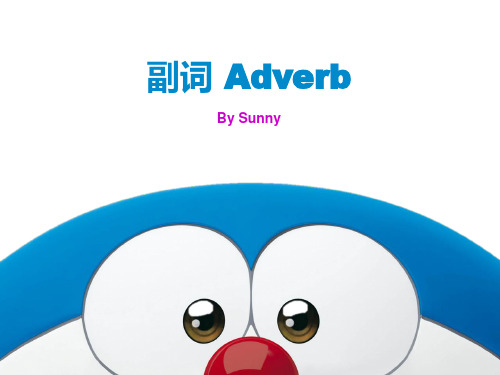
副词 Adverb
By Sunny
一、定义
用来说明事情发生的时叫做副词。
二、分类
1 2
时间副词 地点副词
soon, now, early, finally, once, recently here, nearby, outside, upwards, above
8. The newly built dormitory building is about _____.
9. Last week he promised to do the work at once, But he
A. yet
B. already
C. still
D. ever
10 Chinese food is quite______________American food. A. different from C. similar to B. the same as D. different to
二. hard是副词。修饰动作。(努力地,勤奋地)
The students all study hard. (努力地学习)
My parents both work hard. (努力地工作)
hardly 与 hard 有什么关系?
hardly 几乎不(表示否定)
Peter is very lazy, he hardly gets up early in the morning.
1.Dogs can help blind people walk across the street safely ________ .(safe) 2.The girl was so frightened _________ that she hid herself behind the door. (frighten) Luckily we weren’t caught in the heavy rain last 3._________, night. (luck) 4.The doctor is used to speaking to his patients gently ________ .(gentle) 5.With the help of science and technology, we can get some ____________ programs from the educational Internet.(education) worse 6.The sick man is getting_________ . We’d better send pleasant him to the hospital at once.(ill) 7.--- What a ________ day! Let’s go for a picnic, shall we? --- Good idea! (please) widely
By Sunny
一、定义
用来说明事情发生的时叫做副词。
二、分类
1 2
时间副词 地点副词
soon, now, early, finally, once, recently here, nearby, outside, upwards, above
8. The newly built dormitory building is about _____.
9. Last week he promised to do the work at once, But he
A. yet
B. already
C. still
D. ever
10 Chinese food is quite______________American food. A. different from C. similar to B. the same as D. different to
二. hard是副词。修饰动作。(努力地,勤奋地)
The students all study hard. (努力地学习)
My parents both work hard. (努力地工作)
hardly 与 hard 有什么关系?
hardly 几乎不(表示否定)
Peter is very lazy, he hardly gets up early in the morning.
1.Dogs can help blind people walk across the street safely ________ .(safe) 2.The girl was so frightened _________ that she hid herself behind the door. (frighten) Luckily we weren’t caught in the heavy rain last 3._________, night. (luck) 4.The doctor is used to speaking to his patients gently ________ .(gentle) 5.With the help of science and technology, we can get some ____________ programs from the educational Internet.(education) worse 6.The sick man is getting_________ . We’d better send pleasant him to the hospital at once.(ill) 7.--- What a ________ day! Let’s go for a picnic, shall we? --- Good idea! (please) widely
- 1、下载文档前请自行甄别文档内容的完整性,平台不提供额外的编辑、内容补充、找答案等附加服务。
- 2、"仅部分预览"的文档,不可在线预览部分如存在完整性等问题,可反馈申请退款(可完整预览的文档不适用该条件!)。
- 3、如文档侵犯您的权益,请联系客服反馈,我们会尽快为您处理(人工客服工作时间:9:00-18:30)。
C. less expensive
D. the most expensive
4. The Mars(火星) is far ______ to us than the Pluto(冥王星). We
wish we could live on it one day.
A. close B. closer
C. closest D. the closest
A. great
B. greater
C. greatest D. the greatest
3. Of the two pairs of jeans, I chose ____ one because I hadn’t
enough money on me.
A. expensive
B. more expensive
8
三、分类
5 频度副词 always, often, frequently, seldom, never
6 疑问副词 how, where, when, why 7 连接副词 how, when, where, why, whether,
however, 8 关系副词 when, where, why
5. Mr. Smith thought the Century Park was the second ______ in
Shanghai.
A. large B. larger C. largest
D. very large义
用来说明事情发生的时间、地点、原因、 方式等含义或说明其它形容词或副词程度的 词叫做副词。
13
14
1. Helping others makes us very _____
A. lonely
B. proud
zy
D.harmful
2. I haven’t seen her for a long time. I can _____
remember her name.
A. nearly
10
“hard”到底是形容词还是副词?
一. hard是形容词。
1. 困难的 (相当于difficult)
That question is very hard/difficult, I don’t know how
to answer it. (那道题很难,我不知道怎么解答) 2. 坚硬的。
The stone is very hard. 这块石头很硬。
9
"-ly"副词的用法
1. Please listen to me carefully. 副词用来修饰动词。
2. She is a very good girl. 在这里very是副词,放在形容词good前面,修饰形容
词.(副词修饰形容词,放形容词前)
3. She listens to me very carefully. 这里very放在副词carefully前,起到修饰副词的作用。
12
good 和 well 的区别:
1. good只能用作形容词. He is a good student. I am good at English.
2. well 副词,形容词都可以。 well 副词:He did his homework well. well 形容词: 人的身体健康状况良好
形容词
一.定义: 用来修饰名词或代词, 表示人或事物的性质,特征或状 态.
1
1.An underground train doesn’t run as _____ as a maglev(磁悬浮列 车).
A. faster B. fast
C. fastest D. much faster
2. James Watt was one of _____ scientists at that time.
(6) 面目全非
好的/地 good _w_e_l_l ___ 7
三、分类
1 时间副词 soon, now, early, finally, today, recently
2 地点副词 here, outside, there, home
3 方式副词 hard, well, fast, slowly, really 4 程度副词 almost, nearly, very, quite, rather
4
二、作用
在句子修饰动词,形容词,其他副词或整个句子。
5
三、构成
(1)一般是在形容词之后直接加-ly:
real_r_e_a_ll_y_; sad_s_a_d_l_y_; quick__q_u_ic_k_l_y;
(2) 形容词以辅音字母结尾加y 结尾的变y为i, 再加 -ly:
hungry_h_u_n_g_rily; angry_a_n_g_r_i_ly; easy__e_a_s_il_y_
B. almost
C. hardly
D. quite
3. The light music sounds very _____. I enjoy it very
much.
A. beautiful B. well C. boring D. wonderfully
4.It was late. She opened the door ___ because she didn’t
二. hard是副词。修饰动作。(努力地,勤奋地)
The students all study hard. (努力地学习)
My parents both work hard. (努力地工作)
11
hardly 与 hard 有什么关系?
hardly 几乎不(表示否定)
Peter is very lazy, he hardly gets up early in the morning. Peter很懒, 他早上几乎从不早起。
6
(3) 以e结尾的直接加-ly:
wide_w_i_d_e_ly__; safe__sa_f_e_l_y (truly除外*)
(4) 以e结尾的去e加——y:
possible_p_o_s_s_ib_l_y_; gentle__g_e_nt_l_y_;
(5) 形容词和副词同形的:
快的/地__f_a_s_t____; 早的/地__e_a_r_ly____; 晚的/地__la_t_e____
